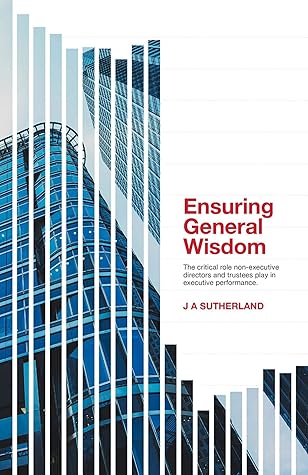Kindle Notes & Highlights
They [NEDs] must be well-informed about the business, the environment in which it operates and the issues it faces. This requires a knowledge of the markets in which the company operates as well as a full understanding of the company itself.
‘However unlikely it might be, what happens if the sea does come over the wall?'
The idea is that NEDs understand the key basis of the model design and what significant assumptions underly this design. It is also important to know where the model stops working and if ‘expert judgement’ is applied who’s expert judgement? All models have limits in their effectiveness, so what are the significant limitations?
how can we reduce the chance of our systems being compromised, our data being locked in a ransomware attack or stolen? And crucially, when it happens, how do we recover?
Baroness O’Neil sets out three dimensions of trustworthiness: honesty, reliability and competence3 and points out having an aim of more trust is wrong:
If there is a good regime of researched and thoughtful papers produced ahead of board meetings that give Executive and Non-Executive Directors time to consider aspects of key decisions then System 2 is in play. However, if papers are late, poorly written or non-existent then the organisation is relying on System 1, the gut feel of people who in very little time agree on a way forward.
When corporate governance is reviewed there is often a piece of file checking, has the board delegated powers in an appropriate way to its sub committees and executives. However, as important is how does the CEO and ExCo delegate decision making, is this structured and clear or is it assumed and opaque?
Effective executives, finally make effective decisions. They know that this is, above all, a matter of system—of the right steps in the right sequence. They know that an effective decision is always a judgement based on “dissenting opinions” rather than a “consensus of the facts.” And they know that to make many decisions fast means to make the wrong decisions. What is needed are few, but fundamental, decisions. What is needed is the right strategy rather than razzle dazzle tactics2
The few fundamental decisions boards should be focusing on are those to do with strategy, business model viability and sustainability, recruitment and retention of talent, culture and risk oversight.
One of the Board’s few fundamental decisions surely is that it checks it is focusing its own time correctly.
A simple rule can help: before an issue is discussed, all members of the committee should be asked to write a very brief summary of their position. This procedure makes good use of the value of the diversity of knowledge and opinion in the group. The standard practice of open discussion gives too much weight to the opinions of those who speak early and assertively, causing others to line up behind them4.
Boards that take a compliance-oriented approach — or structure the process in a way that prevents a true examination of the impediments to board effectiveness — lose the opportunity to gain valuable shared insight into the operation of the board and ways to improve its composition, processes and relationships.
Leaders who have been lucky are never punished for having taken too much risk. Instead, they are believed to have had the flair and foresight to anticipate success, and the sensible people who doubted them are seen in hindsight as mediocre, timid, and weak. A few lucky gambles can crown a reckless leader with a halo of prescience and boldness.
Non-executive directors need to be sound in judgement and to have an inquiring mind. They should question intelligently, debate constructively, challenge rigorously and decide dispassionately. And they should listen sensitively to the views of others, inside and outside the board.1
The sequence in board discussion on major issues should be: presentation by the executive, a disciplined process of challenge, decision on the policy or strategy to be adopted and then full empowerment of the executive to implement.
During a debate into board governance it was notably declared: Every director should have an answer to the question: “What would it take to make me resign
For chief executives, one of the most valuable—and valued—roles that a board can play is to provide counsel and mentorship. Responsibility for leading a large organisation is, in fact, a lonely job and chief executives often have few people to turn to for candid and thoughtful advice. This suggests not only that the board must possess the experience, perspective and wisdom that would be useful to the chief executive but that the relationship between them needs to be underpinned by trust and mutual respect
Chief executives should be able to see their boards as a continually available source of counsel and support,
The board must encourage that conversation: ‘boss I have bad news, the ugly truth is …’, and then, with no shots being fired at the messenger, permit the ugly truth to be recounted in all of its ugly detail. This is a key part of trust and communication, two of the four drivers of culture.
Board meetings have to be regular enough for the NEDs to meet and develop relationships between themselves and the key executives in the business. In my view this is at least eight times and preferably ten times a year.
Returning to what Higgs said in 2003. He described the NED role encompassing four elements: Strategy, Performance, Risk and People: Strategy: Non-executive directors should constructively challenge and contribute to the development of strategy. Performance: Non-executive directors should scrutinise the performance of management in meeting agreed goals and objectives and monitor the reporting of performance. Risk: Non-executive directors should satisfy themselves that financial information is accurate and that financial controls and systems of risk management are robust and defensible. People:
...more


